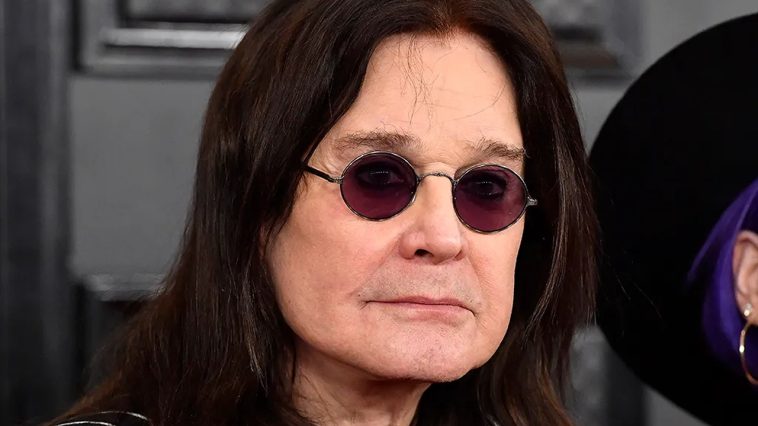Undeterred by ongoing health woes, rock legend Ozzy Osbourne, aged 74, retains his fighting spirit. Having been diagnosed with Parkinson’s disease two decades ago, Osborne has braved numerous health challenges, but he remains optimistic.
Speaking candidly in an interview with Rolling Stone UK, he expressed frustration with media reports suggesting he was facing his final hurdles, with headlines declaring that he had performed Paranoid for the last time.
Osbourne reinforced his determination, stating that Parkinson’s is not a condition that overly occupies his thoughts. When the reporter observed him during the interview, Osbourne exhibited little of the tremors typically associated with Parkinson’s sufferers.
Yet, he does not blind himself to the reality that much of his life has passed, remaining pragmatic about his future despite the challenges he currently endures.
Going into detail about his personal life, the iconic rock star recounted a recent conversation with wife Sharon that ended with the singer’s defiant retort against mortality.
Osbourne, who had just consumed cannabis, was rebuked by Sharon, leading him to respond with an impudent question regarding his life expectancy. He contextualized his remaining years, noting the increased speed of time’s passage in older age.
In a more somber portion of the discussion, Osbourne revealed his recent spinal surgery from last fall. The operation was yet another consequence of a 2019 fall, marking the fourth such incident related surgery. The fall’s impact had far-reaching effects on Osbourne’s life, in and beyond his medical condition.
The surgery proved a significant setback for his health, leaving him nearly incapacitated. Initial optimism following the first few surgeries was dashed by the complications of the second procedure. The final operation involved the insertion of a rod in his spine, bringing about another round of challenges, including a discovered tumour to be removed from his vertebrae.
Osbourne’s recovery journey has been long and arduous. He noted the severe toll on his balance and general ability to function normally. Yet, despite the substantial pain and alterations to his wellbeing, he maintains an eagerness to return to performing.
Expressing his determination, Osbourne emphasized his commitment to quality performances. He vows to return to the stage only if he can ensure a top-tier performance, refusing to allow his health status to soften the hard-edged persona his fans know and love. During the early days of his illness and subsequent withdrawal from touring, his frustration was aimed at himself, medical professionals, and essentially the world at large.
As time progressed, however, Osbourne’s outlook evolved. He realized the necessity to reconcile with his predicament, accepting his new reality. Nevertheless, he asserts a firm refusal to stage a pity-seeking, less-than-whole attempt at performance, expressing a vehement rejection of this idea.
This visceral reaction extends to the prospect of performing in a wheelchair. Drawing comparisons with Phil Collins, who faces remarkably similar issues and chooses to perform from a chair, Osbourne stresses that this is not an approach he is comfortable with.
The inability to formally bid farewell or express gratitude to his devotees on stage has left the trailblazing musician irate.
Despite the hurdles, he harbors hopes of staging limited performances one day, underlining the unwavering loyalty of his fan base, which he affectionately calls his ‘extended family.’ Osbourne explains that his fans not only know every detail of his life, including his pet dogs, but also sustain his affluent lifestyle.
Confronted with the prospect of a full touring schedule being beyond his reach, Osbourne yearns instead for a single triumphant performance. He aspires to stand on the stage one last time and express his deepest thanks for the love and support his fans have lavished on him throughout his career.
Reflecting further on his journey in an interview with Rolling Stone UK, Osbourne ruminated on mortality. The topic arose as he mentioned fellow musicians, close companions who have passed away in recent years, triggering melancholy and deep introspection.
In a moment of stark candor, Osbourne acknowledged an eerie truth: all his old drinking buddies are now deceased. The realization hit him hard, leading to frequent flashes of bitterness and nostalgia as he remembers his fallen comrades.
There is an element of disbelief that he has outlived many of his colleagues. He mused aloud about why he remains while those around him have succumbed. Showing no signs of arrogance, Osbourne confesses that his survival is inexplicable, graciously acknowledging the bittersweet reality.
Almost involuntarily, Osbourne rhetorically questioned his own longevity, reflecting on his past reckless behaviours. He accepts that his survival defies the odds and is not a cause for boasting or vanity. For Osbourne, the fact he is still living is nearly incomprehensible, yet he continues onward, with a cheerful defiance to whatever life throws his way.


